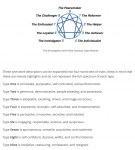For my next campaign, I'm going to use the Ennegram instead or (or perhaps in addition to) alignments and personality traits, ideals, flaws, and bonds.
Enneagram is a model of the human psyche which is principally understood and taught as a typology of nine interconnected personality types.
I like the idea of using a real-world, researched personality system in a fantasy game.
Each of the 9 personalities changes in times of growth and times of stress which allows flexibility in role-playing and growth over time.
https://www.enneagraminstitute.com/how-the-enneagram-system-works/

You can discover your own number by through quizzes like this:
http://similarminds.com/test.html
I'd be curious what number other RPGers are - I'm a 5.
Enneagram is a model of the human psyche which is principally understood and taught as a typology of nine interconnected personality types.
I like the idea of using a real-world, researched personality system in a fantasy game.
Each of the 9 personalities changes in times of growth and times of stress which allows flexibility in role-playing and growth over time.
https://www.enneagraminstitute.com/how-the-enneagram-system-works/

You can discover your own number by through quizzes like this:
http://similarminds.com/test.html
I'd be curious what number other RPGers are - I'm a 5.
